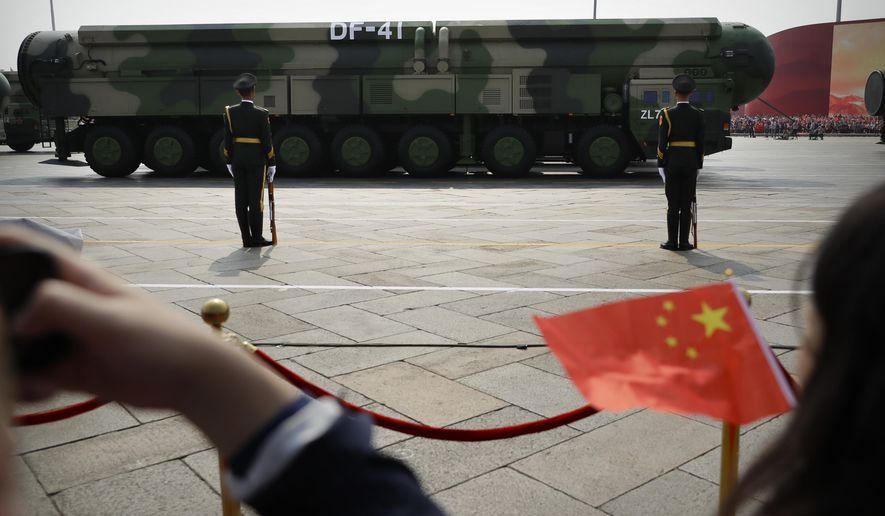The Treasury Department on Tuesday issued regulations to implement sanctions on 59 Chinese military companies aimed at blocking Beijing from building up its armed forces with cash obtained from U.S. financial markets.
The regulations prohibit all U.S. financial and stock companies and individual investors from engaging in securities trading that in any way financially benefits the named Chinese enterprises or their executives. The companies were designated as military entities earlier by the Pentagon.
The companies include a number of major Chinese aerospace and telecommunications firms, including Huawei Technologies, that have already been targeted by the U.S. government for its suspected links to Chinese intelligence services.
The regulations call for either civil or criminal penalties for anyone who violates sanctions contained in a November 2020 executive order by former President Donald Trump, as well as additional sanctions in an order signed by President Biden in June.
The sanctions target parts of the military industrial complex that are closely aligned with the civilian economy in China, in what Beijing has dubbed a “fusion strategy.” The Treasury’s Office of Foreign Assets Controls said that even more detailed sanctions controls will be put in place later, the department said in announcing the rules Tuesday.
The Trump administration’s November 2020 order listed 31 Chinese military companies said Beijing is “increasingly exploiting United States capital to resource and to enable the development and modernization of its military, intelligence and other security apparatuses.”
“At the same time, those companies raise capital by selling securities to United States investors that trade on public exchanges both here and abroad, lobbying U.S. index providers and funds to include these securities in market offerings, and engaging in other acts to ensure access to U.S. capital,” the order said. “In that way, the [People’s Republic of China] exploits United States investors to finance the development and modernization of its military.”
Cutting off access to U.S. capital markets seeks to limit China’s ability to bolster military, intelligence and other security agencies that are using the “ostensibly private” economy, the order said.
The Biden order expanded the sanctions to include companies involved in what critics say are human rights abuses by the communist regime, such as the repression of ethnic Uyghurs in Xinjiang. Mr. Biden said in his June 3 order that additional sanctions were needed to curb Chinese use of surveillance technology to facilitate repression or serious human rights abuses.
Roger W. Robinson Jr., a former National Security Council official in the Reagan administration, was one of the first to highlight the dangers posed by allowing China’s defense firms access to American capital markets. Mr. Robinson said the military penetration of U.S. capital markets was carried out quietly since at least 2012.
A sizable number of Chinese corporations with military links were until recently active in the debt and equity portfolios of millions of ordinary American investors, many of whom are unaware of the connections, Mr. Robinson said in a recent interview.
Among them are contractors for the People’s Liberation Army, construction companies that built military bases on disputed islands in the South China Sea, advanced weapons manufacturers, cyber hackers and companies selling military goods to North Korea and Iran.
“The penetration of the U.S. debt and equity markets by Chinese bad actors represents a national security peril, both in terms of serving as an important source of funding for some of China’s most ominous security threats to vital U.S. and allied security interests, and, over time, giving rise to a massive new China lobby of beholden U.S. investors,” Mr. Robinson said.
In March 2018, China Shipbuilding Industry Co., one of the 59 sanctioned companies, announced plans to build the PLA’s first nuclear-powered aircraft carrier as part of Beijing’s large-scale naval forces buildup. Shortly after the announcement, Mr. Robinson revealed, China Shipbuilding issued a $1 billion bond in the German bond market in Frankfurt timed to completion of the carrier.
The $1 billion bond offering will almost certainly assist in financing construction of a new nuclear carrier, with some of the funds raised coming from U.S. institutional investors, he said.
Another company on the list, state-owned China United Network Communications Group Co. Ltd, known as China Unicom, raised $5.7 billion in an initial public offering on the New York Stock Exchange and Hong Kong Stock Exchange in June 2000. Currently, hundreds of millions of dollars of its stock is held by U.S. state pension funds, Mr. Robinson said.
China Unicom has built the PLA’s vast network of fiber-optic communications, “smart base” stations and other high-technology gear.
In the past, China has sought to skirt U.S. financial sanctions by changing the names of the companies involved in military development.
• Bill Gertz can be reached at bgertz@washingtontimes.com.




Please read our comment policy before commenting.